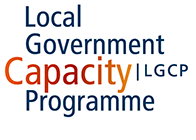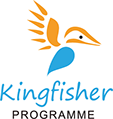
‘Everyone who was allowed to participate in the LGCP projects has grown’, Kofi admits with a due sense of pride. ‘They have each discovered a side to themselves which enables them to progress with their duties, while also making them both creative and strong. So, we are gradually getting closer to achieving our joint aim’.
From: “We have to catch them young”, one of the ‘most significant change stories’ in the LGCP results overview

‘The Kingfisher programme is a flagship programme for the Dutch Water Sector’
The Dutch special envoy for Water,
Mr Henk Ovink

VNG International Annual Update 2017
2 Improving People’s Lives with Basic Public Services
Local governments are often responsible for the provision of basic public services such as water supply and sanitation, basic health care, waste collection, etc. The availability of those services has a huge impact on the health and living conditions of citizens, even to the extent that they can make the difference between life and death. Yet, for various reasons, in many countries local governments are not capable of fulfilling their responsibilities. Their mandate may not be well-defined, their staff may not have the necessary technical or policy-making capacity for the development and maintenance of services, they may lack the political will to make their service supply inclusive, etc. Apart from the immediate effects, this will also negatively influence the prospects for local economic development and lessen people’s confidence in local democracy. Strengthening the capacity of local governments to develop and maintain basic public services is therefore an important element in our portfolio.
In 2016 we completed the Local Government Capacity Programme (LGCP 2012-2016).
The programme contributed to the capacity development of local governments and local government associations in Benin, Burundi, Ghana, Mali, Rwanda, South Africa, South Sudan, Uganda, Palestinian Territories, and Central America. The focus was on local economic development, water, security and the rule of law, food security, and sexual and reproductive health and rights. An overview of the results per country and per theme, supported by most significant change stories and videos, is available here.
........................
From the LGCP results overview:
Gains from the country programme Ghana:
• citizens in Ghana informed and taught to adopt a more favourable approach to hygiene and food safety, making better use of toilet facilities, and creating and improving such facilities themselves;
• civil servants grown into influencers with a distinct presence, capable of spotting exactly when the process threatens to grind to a halt, then stepping in to facilitate changes in their own diplomatic way;
• Environmental Health Officers with modern working practices, switched from a monitoring role to a far more facilitating and educational one.
Because of these gains …the high rate of fatalities caused by contagious diseases reduces in Kumasi, Ghana.
A clear recognition of the positive results of LGCP is the allocation of 22.5 million euro by the Dutch ministry of Foreign Affairs for two follow-up programmes. 17.5 million are assigned for the programme IDEAL, ‘Inclusive Decisions At Local Level’ (2017-2021).
The programme has started in its 7 target countries: Burundi, Mali, Palestinian Territories, Rwanda, Somaliland, South Sudan and Uganda.
The specific objectives/outcomes are:
1) Service delivery by local governments in key policy areas is more responsive and effective (Output legitimacy);
2) Decision-making processes at the local level in key policy areas are more inclusive and participatory (Input legitimacy);
3) The policy and institutional environments of local governments have improved (Enabling environment).
By achieving these outcomes, the programme will strengthen local government structures so that they can cope more effectively with local and national level fragility risks.
On behalf of the membership of Platforma, a network of European regional and local governments and their associations active in the field of development cooperation, we also developed and manage a pilot programme ‘Connect’. Connect facilitates easy access to European regional and local government expertise for their peers in developing countries. In the pilot phase the programme is limited to Cambodia, Colombia, Ghana, Myanmar, and Uganda. This pilot is part of the Strategic Partnership Agreement between the European Commission and Platforma with our European association CEMR as formal contractor. ‘Connect’ aims to create synergies with the EU support programmes for decentralisation and local governance, by bringing in the practical hands-on experience of local governments themselves.
Integrated Water Resource Management (IWRM) is an important challenge in South Africa’s transformation. Since 2012, the establishment of 9 Catchment Management Agencies (CMAs) has been a main priority for the Department of Water and Sanitation (DWS) in its endeavours to ensure effective IWRM, thereby enhancing socio-economic development in the country. Through our Kingfisher programme, which we implement in collaboration with the Association of Dutch Water Authorities, support was provided to CMAs to effectively carry out their water management duties. The support focused on a.o. the development of Catchment Management Strategies, the strengthening of leadership and enhancing cooperative governance with relevant organizations like local government.
The programme boasts a variety of achievements which is underlined by the external evaluation executed by DEGE consult in 2015. Some of the key achievements are:
- the establishment of the CEO forum. The success of the forum has a.o. been proven by the provision of collective input to the draft Water and Sanitation bill;
- the further roll out of the piloted water governance dashboard (HydroNet- a decision support tool) to all CMAs;
- the review of the pricing strategy;
- improved communication between the DWS and CMAs;
- the development of the starter pack: a collection of guidelines, results and documented experiences from the 2 operational CMAs, which was made available to all (proto) CMAs.
The achievements were the basis for NWB Fund and the Rijksdienst voor Ondernemend Nederland (RVO) to support the continuation of the programme for 2017- 2018.
For an overview of the programme, please refer to:
http://www.vng-international.nl/communication/videos/
Policy development and exchange of experience
In The Netherlands we are actively involved in the implementation of the SDG agenda.
We participate in a national coordination structure with focal points from each of the ministries.
And we have written a chapter on the contribution by decentralised governments in the first national report on the implementation of the SDG agenda. Based on this report, The Netherlands will also present a voluntary report to the High Level Political Forum in New York in July 2017.
In 2016, we invested in supporting UCLG’s participation in the Global Partnership for Effective Development Cooperation (GPEDC), a platform aimed at advancing the effectiveness of development efforts, to deliver results that are long-lasting and contribute to the achievement of the SDGs. We were actively engaged in a diversity of preparatory working groups related to the review of the monitoring process of the development effectiveness principles, the organization and facilitation of the plenary sessions in the triannual High Level Meeting of the GPEDC in Nairobi (November 2016) and the creation its outcome document. Due to this active participation, local and regional governments have received enhanced recognition in the development effectiveness debates and possibilities are being explored to better include local governments in the GPEDC strategy and activities like the monitoring process.
